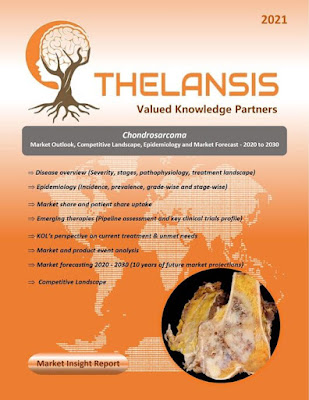Myofascial Pain Syndrome (MPS) – Market Outlook, Epidemiology, Competitive Landscape, and Market Forecast Report – 2024 To 2034
Myofascial Pain Syndrome (MPS) Market Outlook
Thelansis’s “Myofascial Pain Syndrome
(MPS) Market Outlook, Epidemiology, Competitive Landscape, and Market Forecast
Report – 2024 To 2034" covers disease overview, epidemiology, drug
utilization, prescription share analysis, competitive landscape, clinical
practice, regulatory landscape, patient share, market uptake, market forecast,
and key market insights under the potential Myofascial Pain Syndrome (MPS)
treatment modalities options for eight major markets (USA, Germany, France,
Italy, Spain, UK, Japan, and China).
Myofascial
Pain Syndrome (MPS) Overview
Myofascial
pain syndrome (MPS) is prevalent among individuals experiencing musculoskeletal
discomfort. It manifests as localized or referred pain stemming from the muscle
and the surrounding fascia. Contributing factors to MPS include traumatic
events, ergonomic issues, structural anomalies, and systemic conditions.
Currently, the precise pathophysiology of MPS remains elusive. Among these, one
of the most widely accepted theories revolves around the energy crisis within
muscle fibers. Diagnosis relies on clinical assessments, although medical tools
such as electromyography and ultrasound can aid in confirming it.
Electromyography typically detects end-plate noise in trigger points (TrPs),
while ultrasound can differentiate TrPs by revealing hypoechoic areas compared
to surrounding muscles. Treatment aims to alleviate pain and address the
underlying causes. Education on stretching exercises and ergonomic adjustments
is essential for all patients. Although nonsteroidal anti-inflammatory drugs
(NSAIDs) and muscle relaxants are commonly prescribed, their efficacy remains
uncertain based on current evidence.
Geography
coverage:
G8 (United States,
EU5 [France, Germany, Italy, Spain, U.K.], Japan, and China)
Insights driven
by robust research, including:
- In-depth interviews with leading
KOLs and payers
- Physician surveys
- RWE analysis for claims and EHR
datasets
- Secondary research (e.g.,
peer-reviewed journal articles, third-party research databases)
Deliverables
format and updates*:
- Detailed Report (PDF)
- Market Forecast Model (MS
Excel-based automated dashboard)
- Epidemiology (MS Excel; interactive
tool)
- Executive Insights (PowerPoint
presentation)
- Others: regular updates,
customizations, consultant support
*As per
Thelansis’s policy, we ensure that we include all the recent updates before
releasing the report content and market model.
Salient
features of Market Forecast model:
- 10-year market forecast (2024–2034)
- Bottom-up patient-based market
forecasts validated through the top-down sales methodology
- Covers clinically and
commercially-relevant patient populations/ line of therapies
- Annualized drug-level sales and
patient share projections
- Utilizes our proprietary Epilansis and Analog tool
(e.g., drug uptake and erosion) datasets and conjoint analysis approach
- Detailed methodology/sources
& assumptions
- Graphical and tabular outputs
- Users can customize the model based
on requirements
Key business
questions answered:
- How can drug development and
lifecycle management strategies be optimized across G8 markets (US, EU5,
Japan, and China)?
- How large is the patient population
in terms of incidence, prevalence, segments, and those receiving drug
treatments?
- What is the 10-year market outlook
for sales and patient share?
- Which events will have the greatest
impact on the market’s trajectory?
- What insights do interviewed experts
provide on current and emerging treatments?
- Which pipeline products show the
most promise, and what is their potential for launch and future
positioning?
- What are the key unmet needs and KOL
expectations for target profiles?
- What key regulatory and payer
requirements must be met to secure drug approval and favorable market
access?
- and more…


Comments
Post a Comment